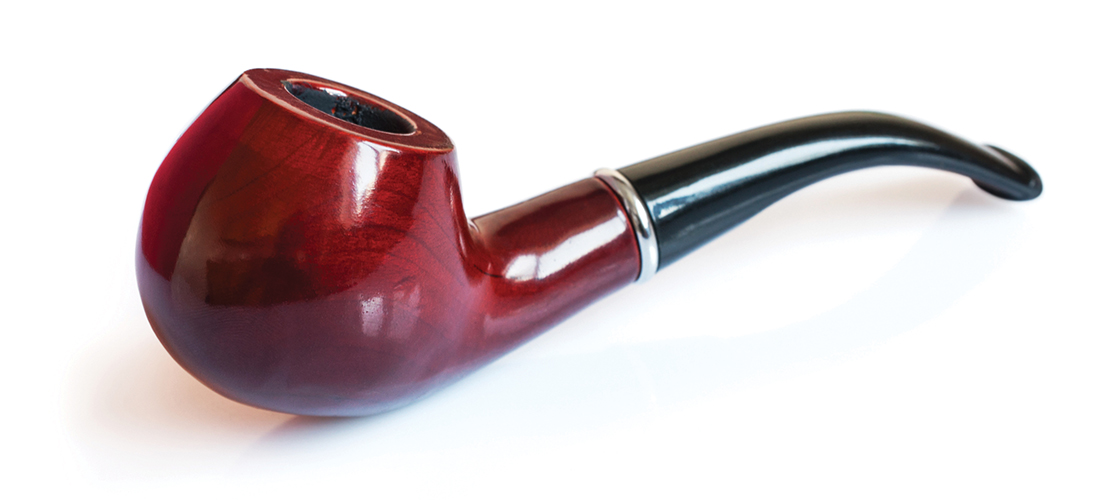Rest uneasy. Wilmington’s ghost hunters are on the case
By Kevin Maurer • Photographs by Andrew Sherman
It’s 11 p.m. on a Saturday night in August, and Doug Anderson is standing in a tenant house at Poplar Grove Plantation talking to a ghost.
Or at least he hopes he is.
The meter in his hand that detects electromagnetic fields is pinging, and when he was in the house earlier it felt like someone was watching him as he set up an infrared trail camera. “Ever heard peanuts called goober peas?” Doug asks. A few seconds later, he thinks he can hear something. “It sounded like he said yes,” Doug tells his team. “But I’ll have to check the tape.”
For more than a decade, Doug and Jane Anderson have investigated the paranormal. They head up Port City Paranormal (PCP). Founded in 2006, the group seeks to “dispel the fear and myth associated with unexplained activity by providing support and understanding to our clients, and the spirits we encounter.”
Besides investigations at Poplar Grove, PCP has worked in local homes, downtown businesses and on the USS North Carolina. The couple have worked on the battleship so many times they know the spirits by name, and Jane even picked up an afterlife boyfriend named Inky. They’ve also investigated a shuttered insane asylum in upstate New York and a plantation house in Virginia Beach.
Sometimes they’ll be called to a private house to investigate a paranormal event. But this isn’t the Ghostbusters. The times they find spirits, there is not much they can do. “You can ask the spirit to leave, but telling a spirit to leave is a joke,” he says. Ghosts are not evil, he adds. They’re just people. “If you were an asshole when you were alive,” Doug says, “you’re going to be an asshole ghost.”
But no matter how many times they talk with a spirit, one question is never answered: What happens when you die? How does the spirit world work? It’s a question that has plagued man since the beginning of time. Cultures have invented stories to explain the afterlife, but that is what keeps Jane and Doug investigating.
“I want to know what they went through,” says Jane. “I want to know how it works. I want to know if there is something else. Can this happen to me? This is the key to the universe. Are we ever going to get an answer?”
The hunt in August is at Poplar Grove Plantation in Pender County, just off U.S. Route 17. The hunters arrive at 7 p.m. and unpack their gear. There are about 10 people in the group — including some hunters from South Carolina — and several new members of PCP. Jane, dressed in jeans, is the ringleader organizing the teams. She’ll lead one team. Doug, in a black T-shirt, will lead the other. While Jane wrangles the hunters, Doug sets up a trail camera — used to capture wildlife — in the tenant house and fiddles with his still camera and audio recorder.
“There has been a lot of activity lately,” Jane says as the group gathers in the house’s basement near the cash register and gift shop. One of the hunters has a T-shirt with “Got Ghosts?” printed across the front.
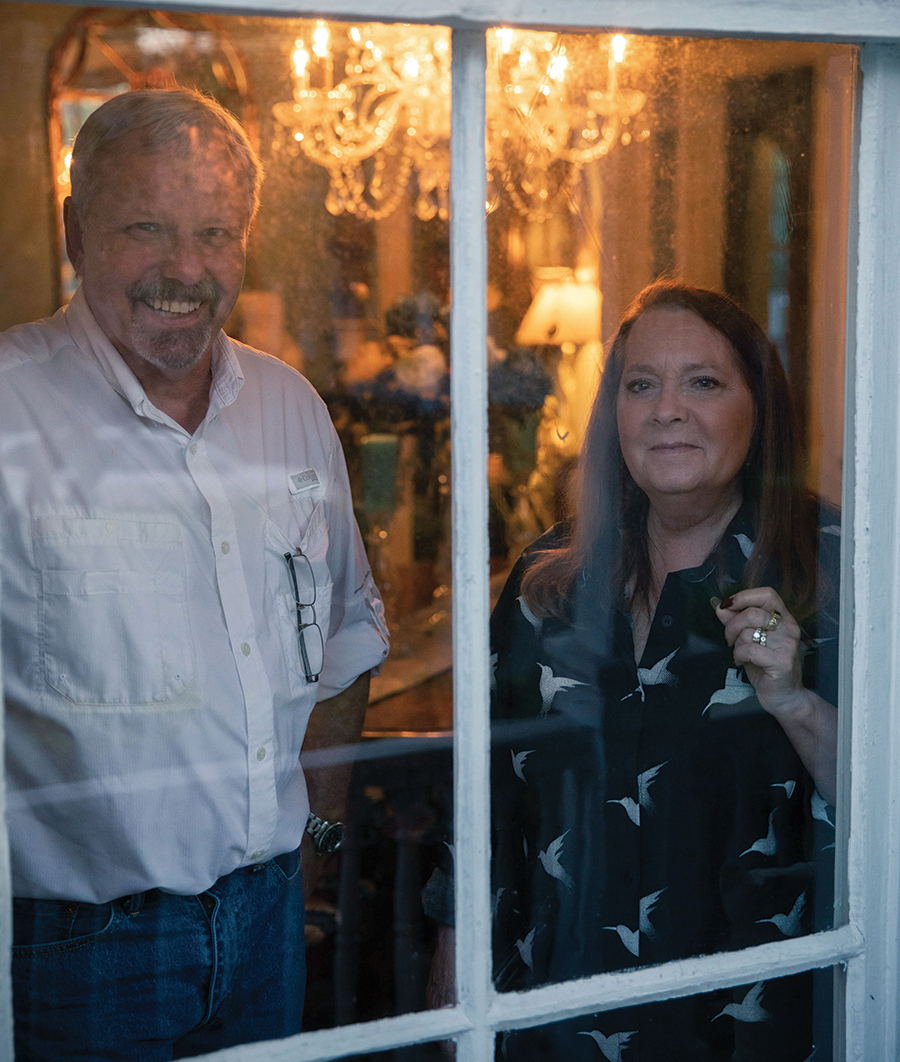
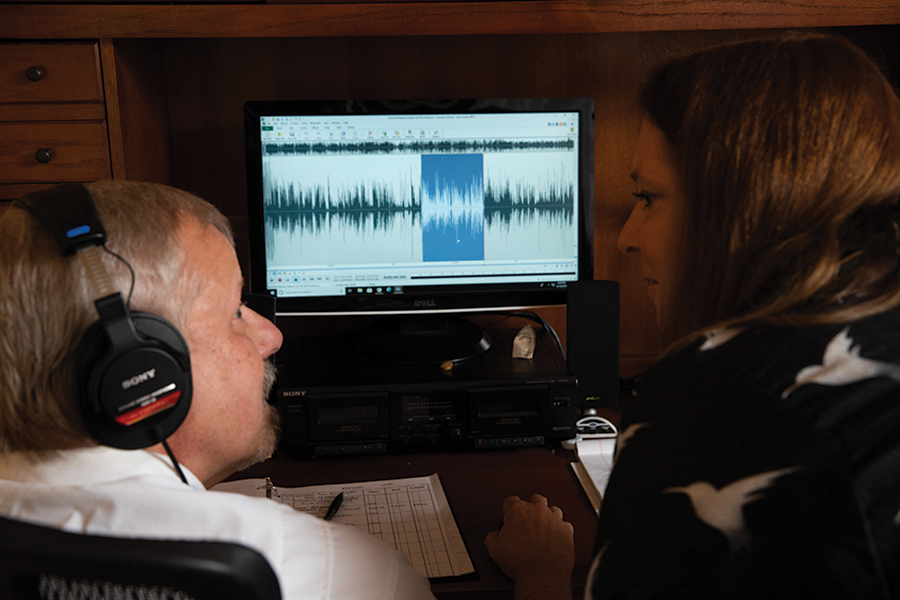
Ghost hunting is a mix of “science and spirituality,” according to the Andersons. Most of the hunters have an audio recorder strapped to their arm and a camera. The camera picks up spectral images. The audio recorder allows the team to pick up electronic voice phenomena (EVP). EVP are inaudible to the naked ear like a dog whistle, but get picked up by the sensitive microphones on the audio recorders.
“We love voices,” Doug said. “That’s why we ask questions.”
Before the hunt starts, Jane hands me a K-II meter. The meter is gray and about the size of a TV remote. When energy is present, the lights fire, with red being the highest spike. It’s the same kind of device used by electricians and cable installers to detect electrical wires.
“Just hang on to this and yell when it gets red,” Jane tells me.
The reason, Doug tells me later, is that spirits need energy.
“If they are going to materialize you usually get an EMF spike,” he says.
Besides audio recorders and cameras, Doug has an infrared thermometer and a more advanced meter that can measure electromagnetic field shifts, which might be caused by a nearby electrical current, or possibly by something else.
The 10 hunters split up into two five-person teams. Team One stays in the house. Team Two heads out to the tenant house. I’m assigned to Team One under the direction of Doug. The hunt starts around 7:30. My team starts in the basement of the house and then heads upstairs to the third floor, working our way down slowly.
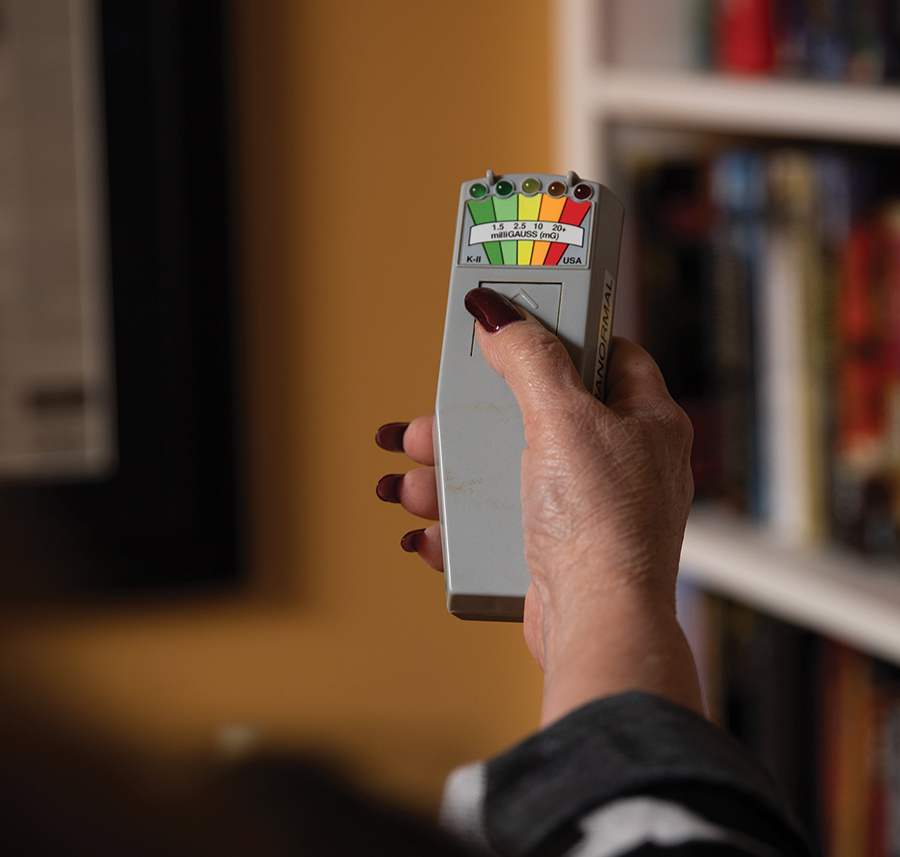
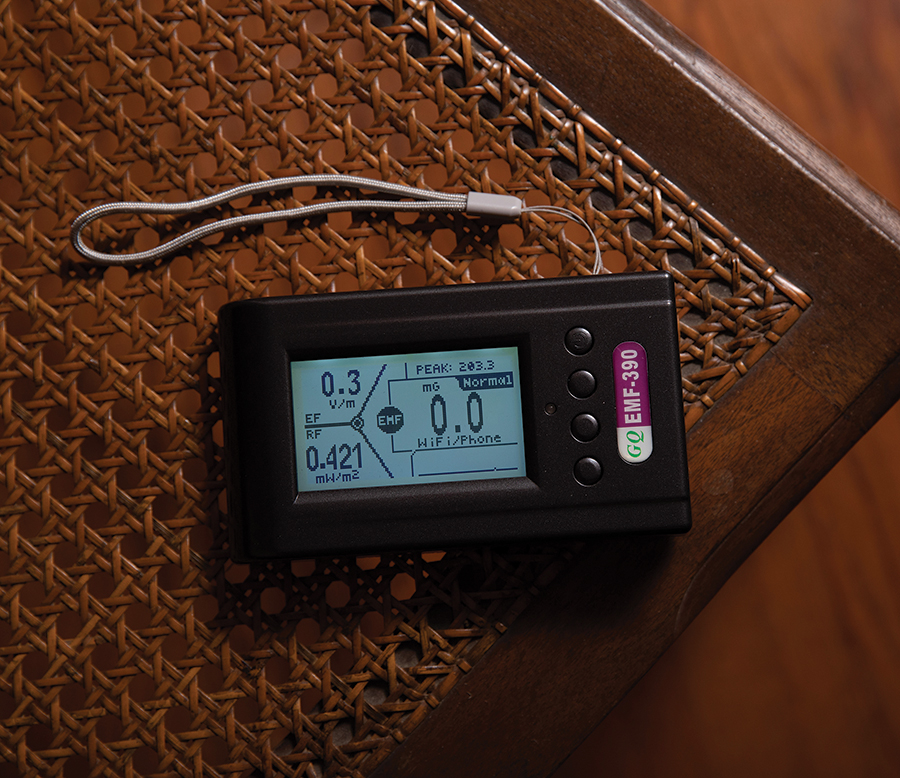
Ghost hunting is an investigation. The hunters fan out like a police CSI team. They videotape and photograph every inch of a room. “We take pictures to get the layout of the house,” Doug says. “But I’ve accidentally caught stuff.”
Doug shot a photo of a “full-body apparition” during an investigation in Virginia Beach. After the visuals are documented, Doug tries to make contact. Gathered in the sitting room on the second floor, he introduces himself: “My name is Doug,” he says. “We’ve been here to visit before. Do you like us visiting the house?” The rest of the team stands silently around him. I look at my meter. Nothing. “Is there anyone here who would like to speak to us?” Doug says. “I’d really like to know who you are. Can you tell me your name?”
Doug’s voice is soothing. He comes off like a therapist. His questions are sincere. He wants to build rapport. Between questions, he narrates what is going on in order to get a clear audio picture. When he stands too close to a clock or someone speaks, he makes note. When a truck rumbles past the house on Route 17, Doug stops talking to the ghost: “That is a truck going by.”
He doesn’t want to mistake a sound for something paranormal.
In the parlor, Doug learns that David Hiram Foy, the eldest son of Popular Grove owners Joseph Mumford Foy and Mary Ann Simmons Foy, passed away in the room. Foy was a recent graduate of the University of North Carolina in Chapel Hill who enlisted in the 41st North Carolina Regiment during the Civil War. He was only in the Confederate Army a few weeks before he contracted typhus and died in the manor house on June 12, 1862. He was 21.
Standing in the parlor, Doug tries to reach him. “David,” Doug says. “Are you around? If you’re not David, can you give us your name?” Nothing. The meters are normal. Doug tries again. “Who is the president of the Confederate States of America?”
Doug is careful not to provoke the spirits. They aren’t here to confront them. “I don’t expect the spirits to perform,” Doug says. But in his attempts to reach David, Doug decides to at least stir up a debate. “This would be considered provoking,” he says. “What do you think of Ulysses S. Grant?” Pause. Doug makes a point of letting the ghosts have a chance to answer his question. “What did you think of Stonewall Jackson?” Another hunter jumps in. “What did you think of General Sherman?”
After an hour or so in the house, Doug’s team switches to the tenant house. It’s pitch black as we enter. The two-room cabin sits just behind the plantation house. The bedroom is small, with a bed. A table sits in the middle of the second room with a creepy doll in one of the chairs.
“I hope we’re not disturbing you,” Doug says as we enter the house.
Doug introduces himself again and asks for the spirit’s name. All is quiet. After the team moves on, Doug returns to the tenant house and asks about the peanuts. Around midnight, the hunters take a break and fuel up on snacks, water and soft drinks as they lounge around the basement of the plantation house.
In the break room, Jane sits at a table talking about some of the reality TV ghost hunting shows. For the past several years, ghost hunting has found its way onto TV, fueling an interest in the field. But Jane and the other hunters are more skeptical of other hunters than they are of the paranormal. Jane says often TV ghost hunters aren’t looking for the paranormal. They are hunting for ratings, meaning they are willing to stage paranormal events, which ruins the field for more serious researchers like her and Doug.
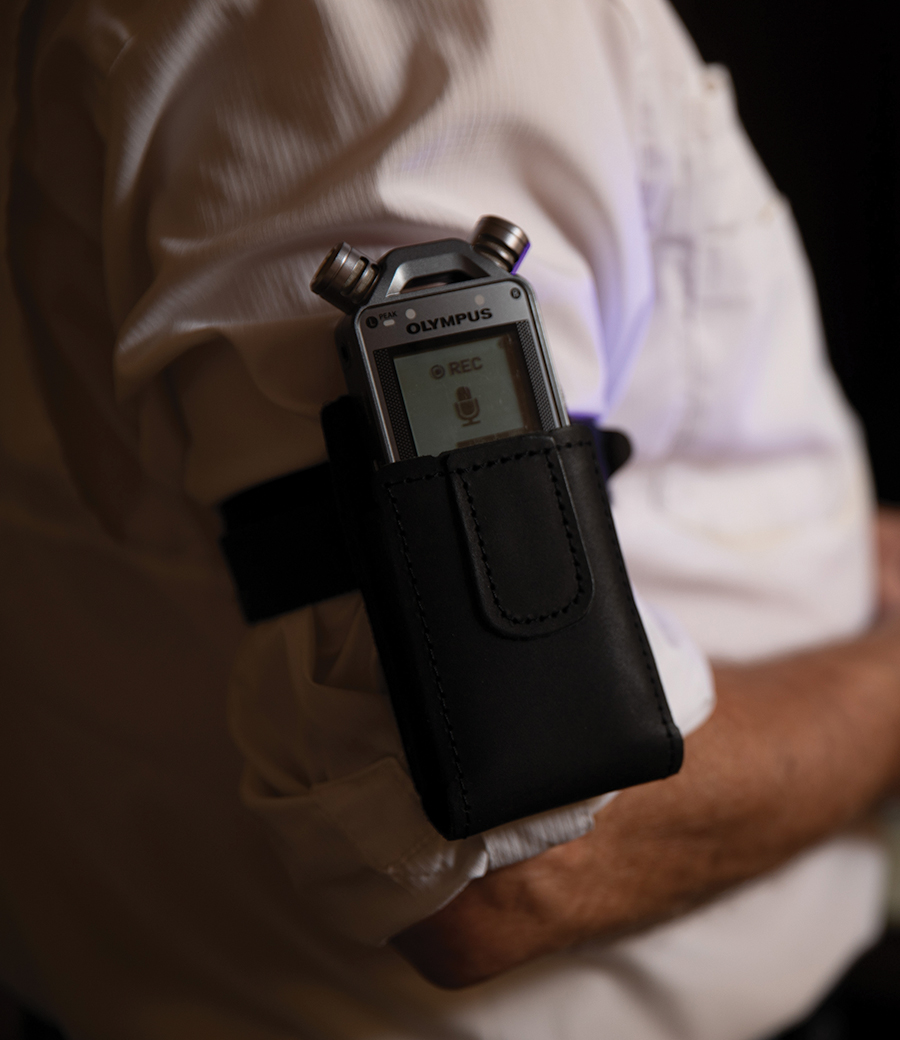
“What we’re doing is looked at like a fraud,” Doug says. “Pictures are Photoshopped, they say. But I don’t know how they explain EVP, especially when we get information we didn’t know about.” On this particular night, however, the spirits are quiet.
“Doug’s new electronic thing did a great job with the anomalous electrical readings,” Jane says a few days after the hunt. “I think the tenant house was the only active spot the whole night.” But none of the hunters captured anything on their cameras or recorders.
Even though Doug thought he got something in the tenant house, it didn’t pass muster. “There was something in the audio, but I just couldn’t make it out,” Doug says. “I really had to alter it. It was faint. I had to boost the levels. It wouldn’t pass for evidence.”
But the quiet hunt won’t keep Doug and Jane from asking life’s unsolved question again and again because its only unanswerable until they get the right EVP.
Kevin Maurer is the author of nine books, including No Easy Day: The Firsthand Account of the Mission That Killed Osama Bin Laden. He lives in Wilmington.


